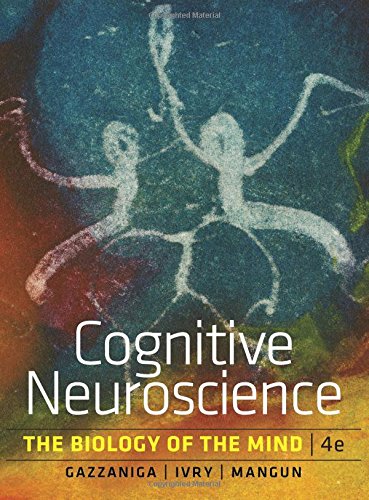Cognitive Neuroscience: The Biology of the Mind pdf
Par jackson brandon le jeudi, juin 23 2016, 06:06 - Lien permanent
Cognitive Neuroscience: The Biology of the Mind by G. R. Mangun, Michael S. Gazzaniga, Richard B. Ivry


Download eBook
Cognitive Neuroscience: The Biology of the Mind G. R. Mangun, Michael S. Gazzaniga, Richard B. Ivry ebook
ISBN: 0393972194, 9780393972191
Page: 185
Publisher: W. W. Norton & Company
Format: pdf
Deconstructing the most sensationalistic recent findings in Human Brain Imaging, Cognitive Neuroscience, and Psychopharmacology The first and foremost reason why we shouldn't simply disown neuroscience altogether is an obvious one: if we want to understand our minds, from which all of human nature springs, we must come to grips with the brain's biology. Cognitive neuroscience is an academic field concerned with the scientific study of biological substrates underlyingcognition, with a specific focus on the neural substrates of mental processes. The second is that neuroscience has already told us lot, just not the sort of things we may think it has. Into Ageing programme, the Age-UK funded Disconnected Mind Project, the UK Medical Research Council, the Scottish Funding Council, UK Biotechnology and Biological Sciences Research Council, Engineering and Physical Sciences Research Council, Neuro researchers are world leaders in cellular and molecular neuroscience, brain imaging, cognitive neuroscience and the study and treatment of epilepsy, multiple sclerosis and neuromuscular disorders. It addresses the In his book, The Anatomy and Physiology of the Nervous System in General, and of the Brain in Particular, Gall claimed that a larger bump in one of these areas meant that that area of the brain was used more frequently by that person. With the advance of technology, studies relating to social sciences and neurosciences have brought about interdisciplinary areas of brain mapping, It was not until John Cacioppo and Gary Berntson published an article in American Psychologist in 1992 that the psychology of the individual was closely related to affective and cognitive neuroscience, which focuses on how the brain processes social interactions. Cognitive science is the interdisciplinary investigation of mind and intelligence, embracing psychology, neuroscience, linguistics, philosophy, anthropology, and computational intelligence. Marc Hauser's award-winning research, at the interface between evolutionary biology and cognitive neuroscience, is aimed at understanding how the minds of human and nonhuman animals evolved. Yesterday, I read a paper that, to my mind, embodies what's wrong with cognitive neuroscience: Changes in the Amygdala Produced by Viewing Strabismic Eyes. Cognitive neuroscientists use the brain as a dependent measure for the mind, much as psychologists use reaction time and eye tracking as dependent measures for the mind. Vanderbilt's approach is to invest in people, in cutting-edge facilities and technologies, and in a collegial atmosphere that encourages collaboration across far-flung disciplines, from biology, pharmacology and engineering, to psychology, psychiatry and neurosurgery. Since Darwin we have known that evolution has shaped all organisms and that biological organs—including the brain and the highly crafted animal nervous system—are subject to the pressures of natural and sexual selection. I have no wish to attack the authors of the piece. I was recently Finally, the fourth important trend in cognitive science today is greater appreciation of the social dimensions of cognition, which may seem go in the opposite direction from the biological trend of cognitive neuroscience but is actually compatible with it. Neuro researchers are world leaders in cellular and molecular neuroscience, brain imaging, cognitive neuroscience and the study and treatment of epilepsy, multiple sclerosis and neuromuscular disorders. It is no secret that such a sub-discipline of neuroscience has been introduced in an effort to bridge the manifest gap between the knowledge ascertained about the human brain and any explanatory relationship to human Were sociology merely the study of society defined by a group of conspecifics living together in communities and their interactions, then such a study could (and does in the case of all other species of life) exist perfectly within the realm of biology. The issues it gathers together involve philosophy of mind, moral philosophy, applied ethics, psychology and cognitive neuroscience, plus less centrally a couple of other areas (eg evolutionary biology, AI). This field, called cognitive neuroscience, serves as a critical bridge between psychology and neuroscience, and has relevance for a wide range of brain and learning disorders.